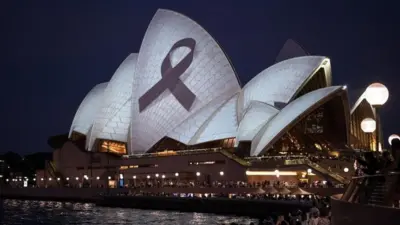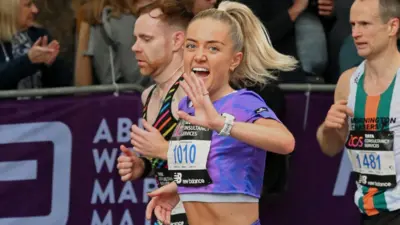We've updated our Privacy and Cookies Policy
We've made some important changes to our Privacy and Cookies Policy and we want you to know what this means for you and your data.
Newport: Radiology failures led to baby placed into care
- By Thamayanthi McAllister
- BBC News
Radiology failures and social services' decisions wrongly left a premature six-month-old baby in care for 26 days, a family has claimed.
The mother-of-two shared her story after reading about another Welsh family's experience.
She said specialists should have been involved earlier and felt "punished".
Newport social services would not comment on individual cases but said no child was taken into care without careful consideration.
Aneurin Bevan health board said it was bound by safeguarding procedures.
'We knew he hadn't been hurt'
The parents - who are being called Sarah and John - took their premature baby son to Newport's Royal Gwent Hospital on 19 January 2020.
The boy - named as Thomas - was accidentally dropped on the floor while he was being changed and on the advice of NHS Direct they took him to the Royal Gwent.
"Because he was born prematurely via forceps and his head was up for a while after birth I was worried it might have been linked to that, as it was a few months before it would be a normal shape."
The following day CT scans were taken then they were told a full investigation of a full skeletal survey, blood tests and a retina test (for his eyes).
The skeletal survey, of 30 X-rays, was taken on 21 January.
The following day the family were told there was a discrepancy on his left tibia and later the same day that a mark was found on his seventh left rib.
Police and social workers became involved.
Social workers said they had to willingly place their child in care to retain parental rights and to be able to visit their son.
Sarah said: "We knew he hadn't been hurt. They thought it was an old injury on his leg and something on his rib and we wanted to know why.
"I'd never left him, apart from two hours with my mum, since I'd had him."
Recalling that day she said: "He belonged next to me. It felt like he died when we left the hospital without him."
As they now shared parental rights with the local authority, many day-to-day decisions about him were removed.
"I felt like I was being punished. It was horrible. I was told not to pack any clothes for him as the foster carer would have everything.
"As it was I insisted on him wearing his clothes, I wanted it to be food I had provided, I wanted him to stay on my milk so we hired a pump."
Image source, Robin Drayton / Geograph
The only decision she was allowed was continuing breast milk.
"He was only six months old and only having a little food in the evening and by the time he came back he was on three meals a day.
"I'd asked for him not to have meat because I'm vegetarian... I was told that it wasn't our concern and that he had to have meat."
For the next three weeks they had to see their son at a contact centre in Newport.
"We had to sign a document saying things like we wouldn't turn up drunk, we wouldn't hurt our child when we were there, we wouldn't be abusive to the contact worker, we wouldn't be doing drugs there, we wouldn't take alcohol in.
"It was a different world. This wasn't something we were part of," she said. However, she said staff at the contact centre were "brilliant".
During this time, the family had to wait for a second skeletal exam on 4 February.
"In the second set of X-rays - the radiologist - the two of them said there was nothing on the rib, it must have been a shadow. They asked if he was crying when the x-rays were taken. He was pinned down on a metal by two strangers: he was crying, he didn't have a clue what was going on.
"Rib was written off. But they said the leg was the same.
"At this point I didn't realise a normal baby radiologist couldn't look at baby x-rays. I didn't realise there was someone more qualified to look at them.
"So they ended up sending them to a specialist in Cardiff - they said it was a paediatric radiologist to someone who was trained at looking at bones of infants.
"They were sent off.
"The results said there was no abnormality. It said he was absolutely fine for his age."
Despite being told this on 6 February, social services wanted a hard copy of the report. Emailed or faxed copies of the report would not be accepted.
"Then they decided they wanted to look into our medical background. They could have done that before this report.
"It felt in the end that they were trying to justify why they've done it," added Sarah.
By 11 February, social services had received both the parents' medical records and the specialist radiologist's report. However Newport social services then wanted to speak to the consultant who wrote the report.
'I hit rock bottom'
A legal meeting held the following day concluded that Thomas could not come home until a care package was in place and he was likely to be placed on the child protection register.
However the care package would not be ready until the following week.
But a week later, on 17 February, the family was reunited and as they had moved house to another part of Wales, the care package was not done.
A child protection meeting held on 6 March unanimously agreed Thomas did not need to go on the register.
At the time the family decided not to lodge a complaint with the authorities as they wanted to put the experience behind them, so the ombudsman did not get involved.
Sarah said: "I wanted to be over it. It wasn't until recently, like when my daughter got to that age, that I hit rock bottom, and I thought I'm never going to get over this.
"At the time we kept hearing Baby P all the time [the controversial case of the 17-month-old baby who died in London of a series of injuries in 2007] and they kept saying it's in the child's best interests; it was in his best interests so it was all justified.
"But really it should be in his best interest to have had the specialist involved much earlier and for him not be taken into care."
Newport Council said: "We cannot comment on individual cases but no child is taken into care without careful consideration of all the circumstances and such complex decisions are not taken lightly.
"It is a multi-agency process informed by expert medical advice, led by paediatricians, and every care is taken to ensure a child will be safe in the family home once a concern is raised. This is done as quickly but as thoroughly as possible.
"We are sure that this is what the public would expect. We would rightly be criticised if a child came to serious harm because we had not acted in accordance with statutory safeguarding procedures.
"We recognise it is distressing for parents when a child is placed in care but there are instances when parents agree to it happening, they work with us and retain parental responsibilities.
"Wherever possible, parents can visit their child regularly, sometimes daily, to allow continued contact and bonding.
"We always act in the best interests of the child. Sadly, we are all too familiar with tragedies that have occurred and hit the headlines because a child was not protected as we would all hope they would be."
What does the health board say?
Aneurin Bevan Health Board said: ''These situations are, by nature, emotional and distressing but the health board is bound by national safeguarding procedures which must be followed to ensure the protection of children and prevention of harm.
"The management of such cases is coordinated, and led by social services, from a safeguarding perspective, with the active engagement of clinicians and the paediatric consultant.
"The radiological element is one part of the overall investigation and the radiologists do not have any contact with social services and are solely involved with the imaging independently.
"The radiological investigation is called a skeletal survey and there is a standard requirement for the skeletal survey to be repeated 14 days later after initial imaging, before a radiological diagnosis can be finalised.
"In the health board, as per standard practice, all skeletal surveys are double-reported by two consultant radiologists with specialisation in paediatric imaging, with an option for a third read after the second set of imaging, at 14 days, is completed regionally.
"The complete finalised report is then fed back to the managing paediatric team to discuss with the multi-agency team, in conjunction with an overall assessment of risk.
"We would encourage the family to make direct contact with the health board so we can ensure they receive the full information and feedback they are seeking.''
Although the Ombudsman for Wales did not get involved in this particular case, it said that it found 16 unique complaints regarding radiology services between 1 April 2017 and 31 March 2022 with three cases upheld and a fourth partially upheld.
The Ombudsman for Wales said: "We do not commonly see complaints specifically about radiology, although that service may be a secondary subject in many of the complaints reaching our office.
"Complaints to us about children being wrongly put into care due to misdiagnosis of X-rays have been very rare over the years.
"Anyone with concerns about their child's care and treatment should raise those concerns in the first place with their healthcare provider. However, we encourage anyone who remains dissatisfied with the response to their concerns to contact our office."
'Meaningful change'
The UK Ombudsman said since January 2019 it had dealt with 124 cases linked to diagnosis/misdiagnosis of X-rays.
Parliamentary and Health Service Ombudsman Rob Behrens said: "X-rays and scans are a vital gateway to health care.
They can provide reassurance as well as the start of any treatment. That's why it is important they are right. Since January 2019, we've received 124 cases linked to misdiagnosis arising from X-rays. In 2021, we published a report Unlocking Solutions in Imaging: working together to learn from failings in the NHS that found failings in the way X-rays and scans are reported and followed up within the NHS.
"These issues are not limited to radiologists, radiographers, or imaging services, but relate to the whole system.
"Our report recommends system-wide improvements for more effective and timely management of X-rays and scans. While some progress has been made, continued buy-in from NHS senior leaders is critical in achieving meaningful change in how imaging is managed as part of patient care."
Neither were able to confirm if social services and the police were involved in these complaints.
Top Stories
Features & Analysis
Most read
Content is not available








